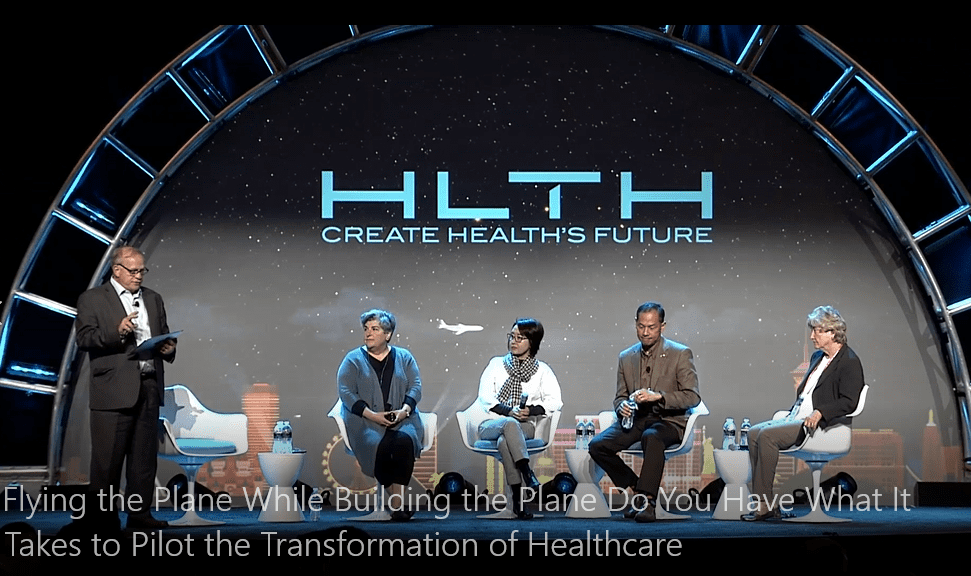
The HealthCare Executive Group (HCEG) was honored to co-host a special Executive Leadership Roundtable October 30th at the 2nd Annual HLTH “Create Health’s Future” Conference. HCEG partnered with the International Association of Innovation Professionals (IAOIP), the Center for Healthcare Innovation (CHI), the Workgroup for Electronic Data Interchange (WEDI) and Dr. Sunnie Giles for the Boardroom-style event. The title of the roundtable was Flying the Plane While Building the Plane: Do You Have What It Takes to Pilot the Transformation of Healthcare?
Over a period of 3 hours, Charles Stellar, CEO of WEDI, moderated a panel of innovation and healthcare thought leaders as each shared their respective insight
- Lynn Hanessian, Chief Strategist, Edelman Health representing Center for Healthcare Innovation
- Dr. Sunnie Giles President of Quantum Leadership Group and author of “The New Science of Radical Innovation”
- Dr. Jason Woo, MD, MPH, FACOG Medical Officer, US Public Health Service; Founder, Learning Core Leadership Through Service; and Consultant to Arbinger Institute
- Dr. DeLeys Brandman, MD, Founding Board member of IAOIP and Medical Director California Telemedicine Services, Babylon Health
Special thanks to our sponsor partner Appian for hosting this Executive Leadership Roundtable!
Insight into Importance of Trust to Pilot the Transformation of Healthcare
Moderator Charles Stellar introduced each panelist and asked them to present their insight and ideas on healthcare innovation. These initial presentations were then followed by a Q & A period that consumed the majority of the three-hour-long roundtable event. Some of the highlights of this extended period of interaction between panelists and ELR participants are presented below.
View the entire video of the Executive Leadership Roundtable here. Thanks to HLTH for providing this recording.
Lynn Hanessian – Trust in Healthcare is Low and Declining
Lynn Hanessian began her introductory presentation by stating that “If I had a nickel for every time somebody said trust in the HLTH conference, I would be able to pay for my healthcare coverage for about a month.” Indeed trust was mentioned many, many times at the HLTH conference. As a healthcare leader with 19 years of experience focusing on the importance of trust to improve healthcare outcomes and lower costs, Lynn was eminently qualified to speak to the importance and impact of trust as a precursor to true innovation.
Lynn proceeded to present a few slides to let people know what the status of trust in health care systems around the world and emphasized that the story of trust in health care is very different here in the United States than it is anywhere else around the globe. Some highlights of Lynn’s opening comments include:
- Compared to other industry sectors, those of us who work in and with health care companies don’t trust our industry any more than those folks that are outside the healthcare industry
- In 2019, trust in hospitals and clinics in the US plummeted by an unprecedented 7% compared to data tracked over the last 5 years – during a time when every other sub-sector of the healthcare industry went up
- Survey shows people blame hospitals and clinics the most for the cost of health care
- People who define themselves as Democrats vs. Republicans have very different views on healthcare and underscore that a one-size-fits-all approach to addressing healthcare – such as Medicare For all – will simply not work.
Start by Championing Healthcare Trust, Innovation, and Change at Home
Additionally, Lynn urged healthcare leaders to start making a move to improve healthcare by telling their stories at home. If your employees don’t understand how that hospital bill got the way it was or how you set your drug prices or the solutions that you’re implementing or the new technologies that are going to change the patient experience, then they can’t be your champion and you haven’t done your job.
You can view Lynn’s slides here and more from the 2019 Edelman Trust Barometer here.
RELATED: Building Trust is Essential to Transforming the Healthcare System
Dr. Sunnie Giles – Command and Control Leadership is Anathema to Innovation
Dr. Giles shared how businesses have the operating environment, leadership, basis of competition, and structure have evolved from Medieval-Feudal times through the Industrial Revolution to the modern-day Digital Revolution. Sunnie shared how the focus on maximizing operating efficiency that evolved during the Industrial Revolution brought initiatives such as Six Sigma, ERP, Balanced Scorecards and things like that.
Sunnie went on to share that, while a command and control leadership environment characterizing the Industry Revolution – and still very common in today’s business environment – focuses on producing success through operating efficiencies. She presented how that environment does not allow or support the different, varying opinions, human connections and emotional intelligence that are basic requirements that effect true innovation.
Everything is viewed as a resource including capital land, equipment, raw materials, and even people. Over the decades, legal departments have been trying to systematically remove any elements of emotion in the workplace. Emotions are messy, unpredictable and represent a legal liability. As a result, much of today’s business environment has become very sterile and devoid of human connection. Businesses have profit-maximizing and human connection minimizing machines.
View Dr. Sunnie Giles slides here.
Dr. Jason Woo, MD – Importance of Changing Mindset vs Behaviors
Dr. Woo shared his insight into how when healthcare leaders try to innovate and change things that their innovation initiatives tend to focus on changing behaviors but don’t often address mindsets and culture. Too much focus on changing the behavior results in behaviors such as get clinicians to order certain tests, adopt certain procedures, and change certain relationships. Leaders tend to bring in new training, new strategies, and new consultants to try to get people to behave differently. Innovation programs disrupt people by attempting to force behavior changes without addressing cultural aspects and changing people’s mindset.
RELATED: Take a Mindset Assessment
By adding layers and layers of demands for behavior change, time and resources are wasted because people resist change when culture does not encourage and support mindset change. Dr. Woo encouraged participants to think about the people their innovation initiatives are disrupting and asked participants how many times they’ve folks gone through process improvement changes.
Nearly all hands from the 70+ participants in the rooms were raised.
When Planting the Seed of Innovation – Tend to the Soil: The People
Jason posited questions about innovation: What’s the right seed to plant to grow innovation? What’s the right technology? What’s the right tool than I need to use to fix this problem?
Dr. Woo shared that if we plant the right seed, we’ll get better outcomes. But the challenge is that while we may plant a seed that’s the best genetically modified seed ever and it may grow. It may produce something less than optimal if leaders don’t cultivate and attend to the soil it’s planted in and will probably not grow as well.
Leaders need to focus on the developing mindsets of the people impacted by the innovation seed planted.
View Dr. Woo’s slides here.
Dr. DeLeys Brandman – Demonopolizing & Amplifying Best-Practice Care
Dr. Brandman shared an overview of Project ECHO® (Extension for Community Healthcare Outcomes) – a movement to demonopolize knowledge and amplify the capacity to provide best-practice care for underserved people all over the world. Originally developed to provide innovative treatment for hepatitis C, Project Echo is has expanded across diseases and specialties, across urban and rural locales, across different types of delivery services, and even across the globe.
At its core, Project Echo is about moving information rather than people. Implicit, explicit, and tacit knowledge is shared in actionable chunks rapidly to those best positioned to utilize the information. Essentially echoing an agile approach to knowledge transfer.
View Dr. Brandman’s slides here and see this page for more information about Project ECHO
Open Discussion About Trust & Innovation – Questions & Collaboration with ELR Participants
One of the hallmarks of HCEG’s roundtable events is open and intimate interaction between panelists and participants. And the ELR at the 2019 HLTH Conference was no exception. The following are some of these questions and panelist responses. We’re providing an audio reply to these questions to minimize the length of this post.
Ensuring Trust with Patients is Key to Transformation of Healthcare
What are some of the more impressive means in each of your experiences for patient empowerment, and tools, and innovation?
Listen to the response from Dr. Brandman, MD here
One of the things that we’ve seen is the rise in maternal death rates within the United States. How do you see a change in culture and using innovation to help curb maternal death rates within the United States while also ensuring trust with your patients? – Alexa Cushman, Sr. Industry Marketing Manager at Appian
Listen to the response from Dr. Woo, MD here
Listen to the second response on this question from Lynn Hannesian here
Collaborating in a Many-to-Many Model
Can you give some examples of techniques that you’ve seen in changing the culture in the many-to-many model along the lines of authority and responsibilities? I see us falling short there partly as an industry as we collaborate amongst each other and we talk about innovation in collaboration together. Whose authoritative and/or who’s responsible for each of the variable components?
Listen to the response from Dr. Giles here
Connect with Each Other and The HealthCare Executive Group
All in all, the Executive Leadership Roundtable at HLTH was an informative and engaging event allowing participants ample opportunity to interact with panelists and each other on the challenges, issues, and opportunities for innovation in healthcare. Given that the roundtable was the afternoon of the last day of the 4-day HLTH forum, all participants and presenters considered it a great success!
HCEG appreciates the collaboration with Dr. Brandman, Dr. Woo, Dr. Giles, and Lynn Hanessian and extends a special thanks to Charles Stellar of WEDI for moderating the panel. And, again, we want to thank our sponsor partner Appian for helping make this event possible.
If you enjoyed the 2019 HLTH “Create Health’s Future” Conference and would like to participate in a greatly scaled-down yet equally valuable version of this gathering of healthcare leaders, consider being part of the HealthCare Executive Group’s 2020 Annual Forum taking place in Boston. MA on September 21– 23, 2020. Moreover, if you’re a healthcare executive who can benefit from entending your network and collaborating with your C-suite peers, consider becoming a HCEG member.
In the meantime, be sure to follow us on Twitter, Connect with us on LinkedIn and subscribe to our eNewsletter.
See also Healthcare Executives Create Health’s Future at 2nd Annual HLTH Conference
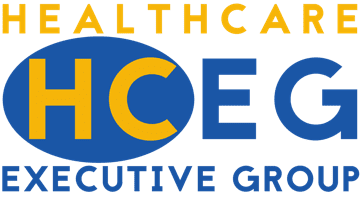

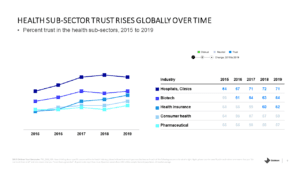
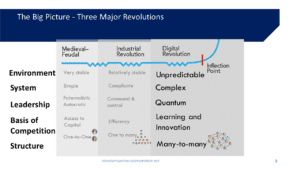
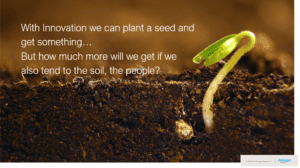
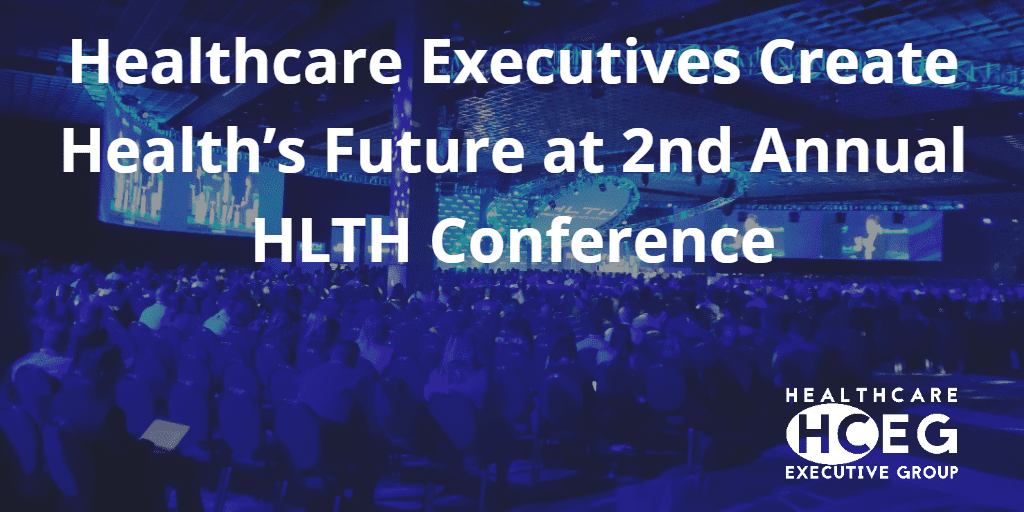

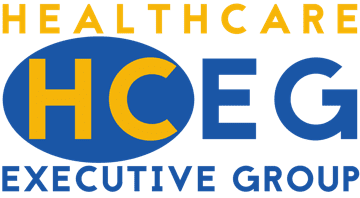
[…] Recapping: Do You Have What It Takes to Pilot the Transformation of Healthcare? […]
[…] Do You Have What It Takes to Pilot the Transformation of Healthcare? […]